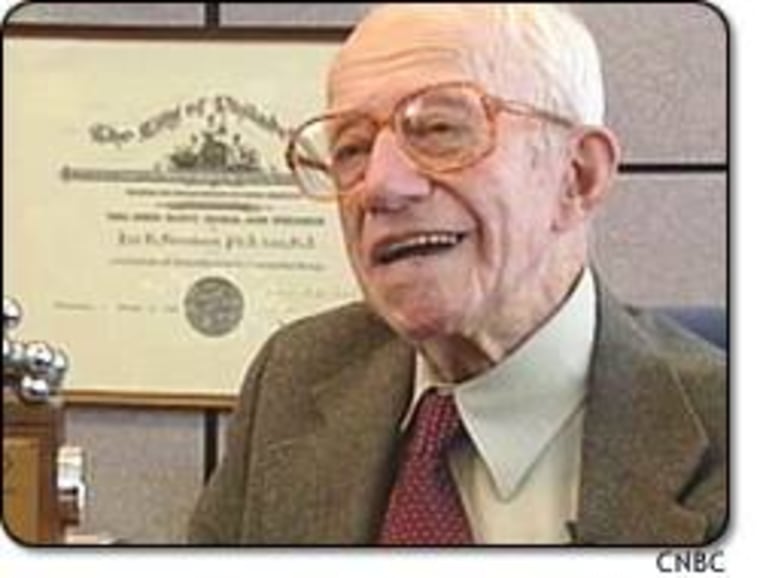A cultural phenomenon is headed over the hill. A tiny pill that became a part of the American lexicon and inspired novels like “Valley of the Dolls” and songs like the Rolling Stones’ “Mother’s Little Helper” is hitting the big four-oh this weekend. Forty years ago this Saturday — Nov. 15, 1963 — the Food and Drug Administration approved Valium.
This year, Roche is marking two major milestones: The 40th birthday of its first big-time drug, Valium; and the 95th birthday of the anti-anxiety pill’s inventor, Dr. Leo Sternbach.
Sternbach still occasionally comes into the office that Roche keeps for him at its U.S. headquarters in New Jersey, although after discovering the billion-dollar drugs Valium and Librium the scientist really didn’t need to work in the lab or anyplace else anymore.
“I love to work in the laboratory and make new compounds,” Sternbach says.
Valium might never have been discovered if not for the foresight of Roche executives. Around 1940, the Swiss company moved about a dozen Jewish employees and their families, including Sternbach, to the United States in case the Nazis invaded Switzerland.
It also took the persistence of Sternbach. Thinking the molecule he was studying lacked promise, he had put it on the shelf. Then one day, he says, he decided to take another crack at it. And lo and behold, after testing the compound on lab animals, Valium was born.
“They [the animals] fell asleep and they did not die if you gave them large amounts.”
Sternbach even used himself as a guinea pig. “I tried some various things which were very potent and once they called my wife to pick me up because I was practically unconscious.” Of course research methods were far less sophisticated in those days. Times have changed.
“We have computer modeling. We have simulations, molecular biology, cellular biology, you name it,” said Roche senior research director Dr. Louis Renzetti.
“It runs the gamut of technological breakthroughs,” said Renzetti, one of the many scientists Sternbach recruited or mentored over the years. “Dr. Sternbach had his mind, and he could see what he needed to change to get the structure right to get the properties that became the medicine. That’s a true visionary.”
For patients, Valium was a tranquilizer. But for Roche it was more like a stimulant, putting the company on the fast track to become one of the world’s leading pharmaceutical manufacturers.
“Valium was a transforming drug, a breakthrough in every respect,” says George Abercrombie, chief executive office of Roche America, who was a pharmacist dispensing Valium when it was the most prescribed and most talked-about drug in America.
“It was clearly the Lipitor of its time for a sustained period of time,” he said, referring to the best-selling anti-cholesterol drug.
In 1973 Valium hit peak sales of $230 million, which back then was considered a blockbuster. With dozens of new anti-depressant and anti-anxiety medications having come on the market in the past four decades, last year’s Valium sales were less than half that amount.
Finding the next Valium-like blockbuster is not as easy as it was back in Sternbach’s day. But he says there’s a simple cure for the research and development anxiety most big pharmaceutical companies are suffering from today. “My legacy is that you should keep trying and trying.”
Large pharmaceutical companies would tell you it’s not for lack of trying that they haven’t been able to have more Sternbach-style successes.
It has become much tougher to find compounds that work in new ways, as evidenced by yesterday’s news out of Merck, which is scrapping an ineffective anti-depressant that was in late stage development.
But Valium was not without its downside for Roche. The drug became quite controversial because a lot of people became addicted.
Ironically Sternbach says his wife never let him pop a Valium after the incident in the lab when he nearly knocked himself out with an overdose of another experimental drug.
